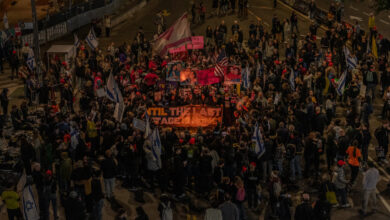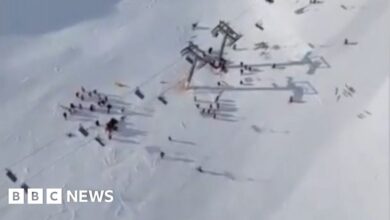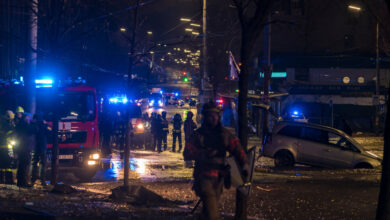Israel marked one year since the Hamas attack when fighting broke out
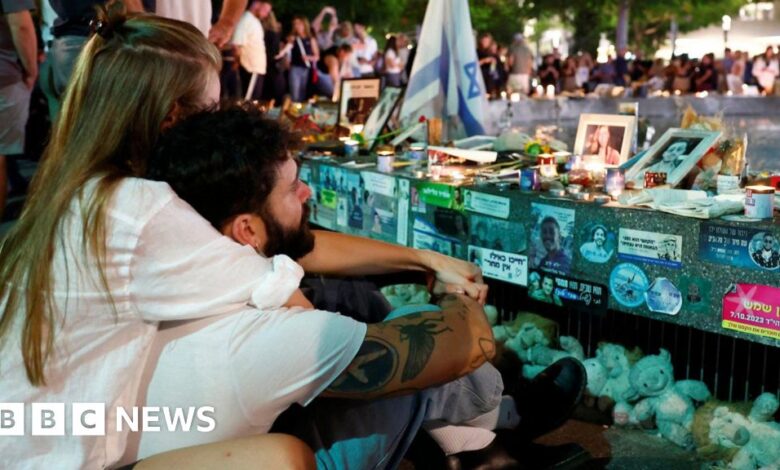
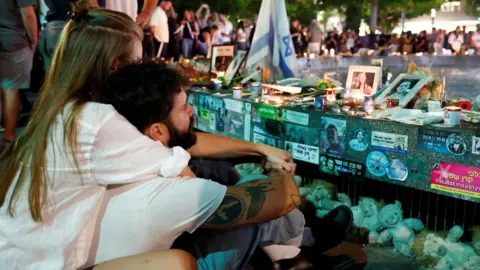 Reuters
ReutersIsrael held ceremonies to remember the victims of mass killings and kidnappings carried out by Hamas on October 7, 2023, as fighting continued in the Gaza Strip and Lebanon.
A year after the attack – which left about 1,200 people dead and 251 taken hostage – Israeli Prime Minister Benjamin Netanyahu vowed to prevent such an attack from happening again, saying the armed forces Israel is “changing the security reality” of the region.
According to the Hamas-run Health Ministry, since October 7, nearly 42,000 people have been killed in Israel’s offensive in Gaza.
As the anniversary progressed, Israel said it had intercepted more than 100 rockets fired by Hezbollah in Lebanon as well as projectiles launched by Houthi forces in Yemen and from Hamas in Gaza.
Overnight, missile sirens continued to sound in northern Israel and several other towns were declared closed military zones, as Israel appeared prepared to expand its ground offensive across the Lebanese border.
On Tuesday morning, the Israel Defense Forces (IDF) said Suhail Hussein Husseini, a logistics commander for Hezbollah, was killed in a “precision, intelligence-based attack in the Beirut area” on Monday. Hezbollah has not commented.
The IDF said Husseini was responsible for managing the budget and logistics of Hezbollah’s most sensitive projects, including war plans and other special operations.
The United States has indicated that it supports targeting Hezbollah in Lebanon – but is concerned that what Israel has described as a limited operation could quickly turn into a prolonged and large-scale conflict than.
And as American and Israeli officials discussed Israel’s response to last week’s unprecedented Iranian missile attack, CIA director William Burns warned that there was “a real danger of escalation.” further in the area”.
Last October, gunmen from Hamas in Gaza breached the border fence and attacked neighboring Israeli villages, Kibbutzim, military posts and the Nova music festival.
On Monday, families of hundreds of people killed and dozens taken hostage at the festival gathered at the site early for the first memorial event of the day.
Holding pictures of loved ones, they listened to the final music played at the festival before Israeli President Isaac Herzog observed a minute of silence at 06:29, the moment the attack began.
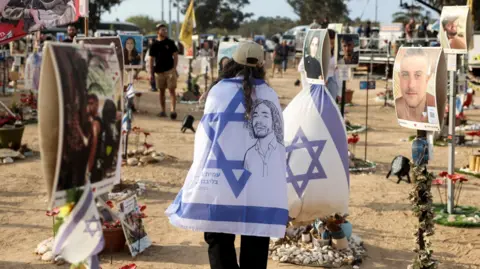 Reuters
ReutersIn neighboring communities also attacked by Hamas gunmen, smaller events were held.
Elsewhere, Netanyahu visited the Iron Sword memorial in Jerusalem for victims of Hamas attacks, lighting a candle “in memory of our fallen hostages.”
In Tel Aviv’s largest park, Israeli families gathered for an event billed as the Memorial Service for Bereaved Families, replacing the official government commemoration.
Some of Israel’s most famous singers gave emotional performances, while images of victims flashed on the screen.
The stage was decorated with items representing the attacks including burned and damaged cars from the Nova music festival, and children’s bicycles and swings from the Be’eri kibbutz.
Outside Israel, US President Joe Biden joined other world leaders in condemning the “unspeakable brutality” of Hamas attacks a year ago.
He also expressed horror at the war that followed, saying “too many civilians suffered, too much”.
Mourners also gathered at vigils around the world including in Australia, South Africa, Germany and the US.
In the UK, Sir Keir Starmer told the House of Commons that he supported Israel’s right to self-defense. However, the British Prime Minister affirmed that there is no military solution to the current crisis and called on all sides to “step back”.
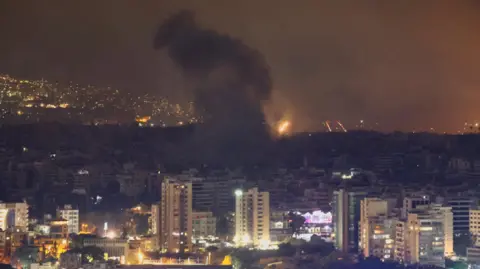 Reuters
ReutersHowever, as the commemoration took place, wider conflict in the region broke out.
The Israeli military said Hezbollah fired more than 130 rockets across the border from Lebanon. Most were shot down, but some hit the cities of Haifa and Tiberius.
Previously, Hamas also launched rockets into Tel Aviv from Gaza. The military said ballistic missiles were fired at Israel from Yemen but were intercepted.
During the day, Israel carried out several air strikes and several ground attacks on Lebanon.
The Israeli military said it was expanding operations against Hezbollah, warning people in southern Lebanon to avoid using boats in the sea or rivers south of the Awali River.
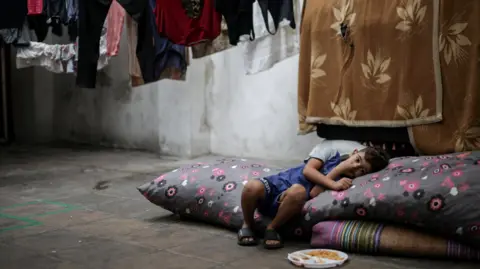 Reuters
ReutersThree weeks of intense Israeli airstrikes and other attacks in Lebanon have killed more than 1,400 people and displaced another 1.2 million, according to Lebanese authorities.
Hezbollah – a Shia Muslim political, military and social organization that holds significant power in Lebanon – remains defiant despite suffering a series of devastating blows in recent weeks, including the killing of leader and most of the top military commanders of this organization.
On Monday, the group asserted it was “confident… in our ability to resist Israeli aggression”.
The Israeli government – which considers Hezbollah a terrorist organization – has pledged to ensure the safety of tens of thousands of displaced residents returning to their homes near the Lebanese border after a year of cross-border fighting due to the war. Caused by Gaza.
Hostilities have steadily escalated since Hezbollah began firing rockets into northern Israel on October 8, 2023, a day after a deadly attack by ally Hamas on southern Israel.


